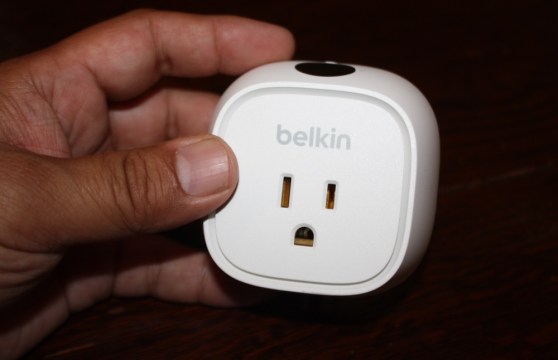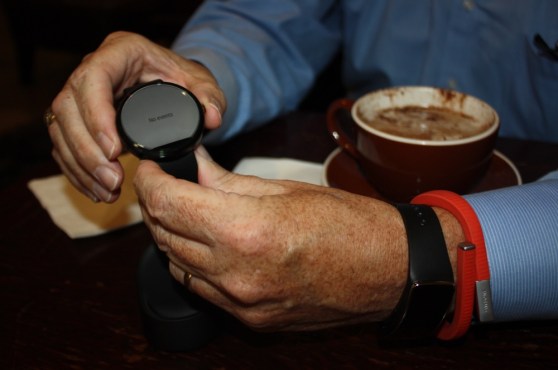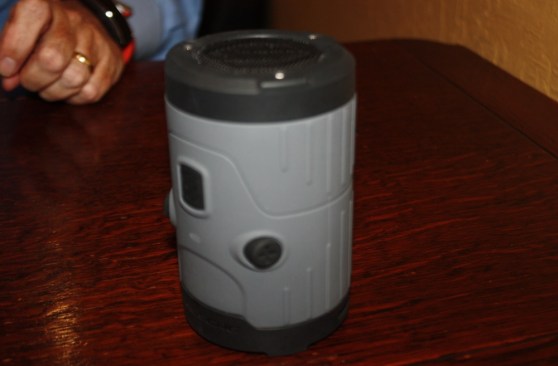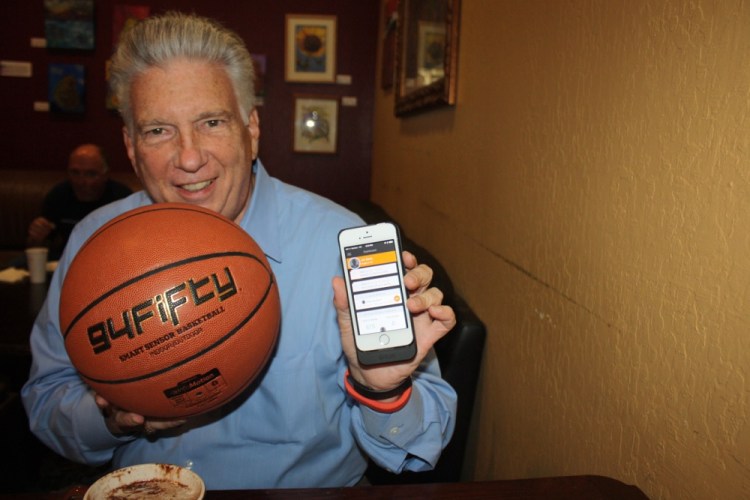
Above: A smart wall plug from Belkin
Barry: A lot of these things certainly have the potential to make us happier, to make life easier. One of my theories, personally, I think technology is neutral, if not benign. It’s what you do with it. You go all the way back to radio, the early days of radio, when it was used to great effect. On the one hand I was just watching this Roosevelt program on PBS. It’s spectacular. You had his fireside chats. But on the other side, radio was being used by Hitler and Goebbels and those guys. Does that mean radio is good or bad? It’s what it is. It’s how you use it.
The thing that’s a concern, especially in the medical part of it. When everything is connected, the issue is privacy. Years ago, when they had the Clarence Thomas hearings, you had people talking about how they found the video store where he rented porn or whatever. That was the Dark Ages compared to what everybody knows now. If you’re connected, someone can potentially do something with that. Security and privacy, especially with health records — some of the fears are unfounded. Some are certainly issues that have to be addressed. As an optimist, I’d say that the technology will solve these issues, too. But it takes time for that lag to catch up.
VB: Some of the stuff that’s disturbing about possible privacy invasions—There are so many groups on the internet now organizing hate campaigns. You have GamerGate. Some gamers in this group are up in arms about feminists coming into the industry and lashing out by doxxing these women, putting their home addresses out on the Internet and threatening them. It’s easy for them to invade privacy and easy for them to organize a hate campaign around that.
Barry: Yeah. They have this Internet megaphone they can use to stir all these guys up.
VB: That part of it is very unsolved so far, how you deal with that. How do you stop that?
Barry: That’s one thing I’ve seen. As I was saying about one of my theories, technology is basically neutral. When people say things have changed so much — one of the great things about watching that Roosevelt program is seeing how vicious and wicked politics were. Everybody says it’s worse than it’s ever been now. Bullshit. That’s not true. If you look at the stuff with our founding fathers, Hamilton, Madison, Jefferson, they hated each other, at least politically.
Human nature doesn’t change. Technology gives you different ways to be a jerk or a Mensch, basically, to put it nicely. But one big difference is that capability on the Internet to megaphone hate or love or anything in between. You can gather a cohort of like-minded people, hopefully for something good. There are as many examples of good stuff – all these different campaigns. The ice bucket challenge or whatever.
VB: You could set up a bunch of cameras to protect somebody’s house.
Barry: Exactly. The other biggest change in the last 30 years, nowhere do product introductions happen more quickly than in the smartphone business. They just keep on coming. This is going to be a challenge here, because the watch business is one … accessory to your smartphone, [and] at this point it’s a pretty expensive accessory.
The watch business has only been around for 150 years. That started with the railroad guys, in the late 19th century. Then everybody had to have a watch. You had a nice watch and passed it along. Then, in the last 20 years, watches have fallen off, except for fashion watches and the real high end. Kids say, “Why do I need a watch?” It’s an interesting market to see if it does become something where I can talk into it or hear.

Above: Another smartwatch in Barry’s collection
VB: People said Apple killed the watch with the smartphone, and now they’re going to bring it back.
Barry: It’s interesting. That’s a market that’s not like the other markets they jump-started, the ones that were moribund or hanging around – the MP3 market, the smartphone market, the tablet market.
The key to anything here for the mass market – you name the product – is convenience. Computer guys have been talking about that forever, about plug and play. Plug and play is a television set, or it used to be anyway. Now you have to hook all this other stuff up to it. But any of these devices, if they’re easy to use, reasonably priced, and do stuff that you want, you gotta have them. That’s my story and I’m sticking to it.
There’s always this overused term, “innovation.” It’s become one of those things where if you need a drinking game at these events, you wouldn’t make it through the first five minutes. But when you think about all this stuff, all these product categories like the smartphone: The TV did it, and the VCR created the video industry, letting you watch what you want when you want. Then things like Tivo made it easier. Then where you want, with things like the Slingbox, and now all these Internet connections. Wireless has gotten so good ….
The game-changer, probably the biggest of all, is the smartphone. Think of all the apps. Think of what’s beginning now with mobile payments. Another big part of our holiday survey this year, more than 50 percent of people now are buying online, up from 40-some last year. But using a mobile device to purchase, those numbers are way up. I think well over three quarters. The mobile phone has changed that, and that’s going to change all these payment things.
VB: You see Apple Pay coming in. These new things they introduce, you wonder whether they’re going to become dominant, or just become one more thing – Apple Watch, Apple Pay.
Barry: The Apple Pay, I think, is another area. Even in phones, if you look worldwide, they’re not really dominant. Even in tablets now, especially the less expensive and smaller tablets. There are some who see them as actually reacting to the success of Samsung primarily, but also just about everybody else in the tablet market. Amazon really shook that up when they introduced the Kindle Fire at $199, with the smaller screen size. Apple took note.
That’s going to be a tight squeeze there for big phones and small tablets, bigger tablets and laptops. For a lot of things, you’ll still need a laptop. If your kid’s going off to school they really need a laptop. A tablet’s good for fun, but you really need a laptop.
VB: There’s a thought that they were going to do bigger laptops for the enterprise, but that didn’t happen.
Barry: Bigger tablets, too.
VB: Yeah, the 13” tablets didn’t arrive.
Barry: Did you see the 20” tablet? There’s a company called Fubu that’s basically making kids’ stuff. It’s designed to lay on a table and play games. Microsoft’s had those a long time.

Above: Jim Barry blasted Waylon Jennings on this speaker.


